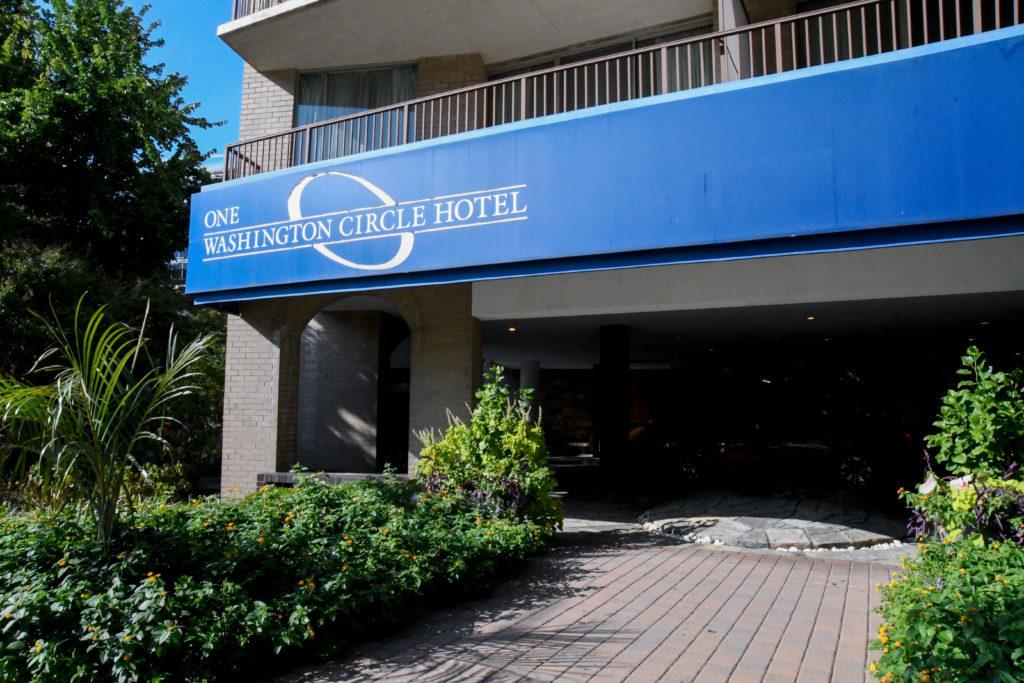Updated: Sept. 26, 2019 at 12:43 p.m.
GW’s agreement to pay $1 million for each semester students live off campus past the projected end date for Thurston Hall renovations shows a commitment to complete construction on time, local leaders said.
Money collected from the fine will fund the Foggy Bottom Association Defense and Improvement Corporation, which provides grants to individuals and community organizations to fund neighborhood improvements, according to an agreement passed last week. Local leaders said the fine shows GW’s commitment to the project in light of resident complaints about housing students off campus during renovations.
University spokeswoman Maralee Csellar said officials attended community meetings at the end of last academic year and at the beginning of this semester to negotiate the terms of the housing plans with the Foggy Bottom and West End Advisory Neighborhood Commission.
“The ANC wanted assurance that the University would complete its project on time,” Csellar said. “Since we are confident that we will be able to complete the project in the allotted time, we were comfortable agreeing to a monetary penalty should we not meet our obligations. We look forward to continuing the ongoing dialogue with the community through the duration of this project.”
The University plans to house students in The Aston, One Washington Circle Hotel and 1959 E St. while Thurston Hall renovations are underway. Construction on the hall is scheduled to finish no later than fall 2022.
Patrick Kennedy, an ANC commissioner who represents the section of D.C. in which Thurston Hall is built, said many community members are more satisfied now that officials have fleshed out where displaced students will live off campus.
He said the $1 million fine is an “eye-catching” figure that represents the University’s dedication to its project deadline.
“More than anything else, I think that’s just a testament to the University’s willingness to commit to that figure of time that it’s going to take to get this project done, and in so doing, I think that can give the community a bit of confidence that the condition is exceptional,” he said.
Kennedy, an alumnus who lived in Thurston when he was a student, added that potential disruption to local residents from off-campus students will be “well worth it” for the renovated hall, saying the renovations will improve the first-year experience.
Thurston has sustained mold plagues and issues like splintered floors and irregular water pressure.
“The first impression they have of the University is the first impression they have of the neighborhood, the first impression they have of the city, and based on everything I’ve seen, I think it’s going to greatly improve that first impression for a lot of students for many years to come,” Kennedy said.
ANC Commissioner Detrick Campbell said the $1 million amount sprung from constituents’ shared concern about increment noise levels from undergraduates who move into the neighborhood.
Campbell said recent negotiations with the University to address the noise concerns have improved from a few months ago, when officials discussed moving students north of One Washington Circle Hotel without communicating with the ANC. Since then, conversations about the settlement agreement have been “in good faith,” and officials involved in the project, like Associate Vice President of Safety and Security Scott Burnotes, have attended ANC meetings.
“It required us to protest a lot of their development at the time, and we just wanted that conversation to happen,” Campbell said. “We would have loved if it happened sooner so we didn’t have to protest, but at least the thing is it did happen.”
Senior and ANC Commissioner James Harnett said the fine could be used for completing projects, like those Boston Properties is undertaking as part of the agreement to demolish 2100 Pennsylvania Ave. Under that construction plan, Boston Properties is working to improve sites around campus, like redesigning the traffic lights at the intersection of 22 and I streets.
“What it allows us to do is to not have to decide today what we would want to use that money for if we get a million dollars or $2 million or $3 million, and allows us to make sure that if GW does go over their defined plan with the project, we’d be able to use that money to meet the needs of what the community wants three years from now,” Harnett said.
Foggy Bottom Association President Marina Streznewski said the community is largely satisfied with the University’s plans for Thurston, but some residents are still concerned about noise and misbehavior. She said the $1 million figure offered by GW was made with the intention of completing Thurston within two years, but the University will likely finish construction on time and not have to pay.
“I do not believe the University would have offered this financial incentive if they weren’t 1,000 percent certain that they wouldn’t need to pay it out, which means that the students will be moved back into Thurston within 24 months, which is the best of all possible outcomes for everybody, especially the students,” she said.
This post has been updated to reflect the following clarification:
This post was updated to clarify a paraphrase from James Harnett about how the $1 million fine could be used.





